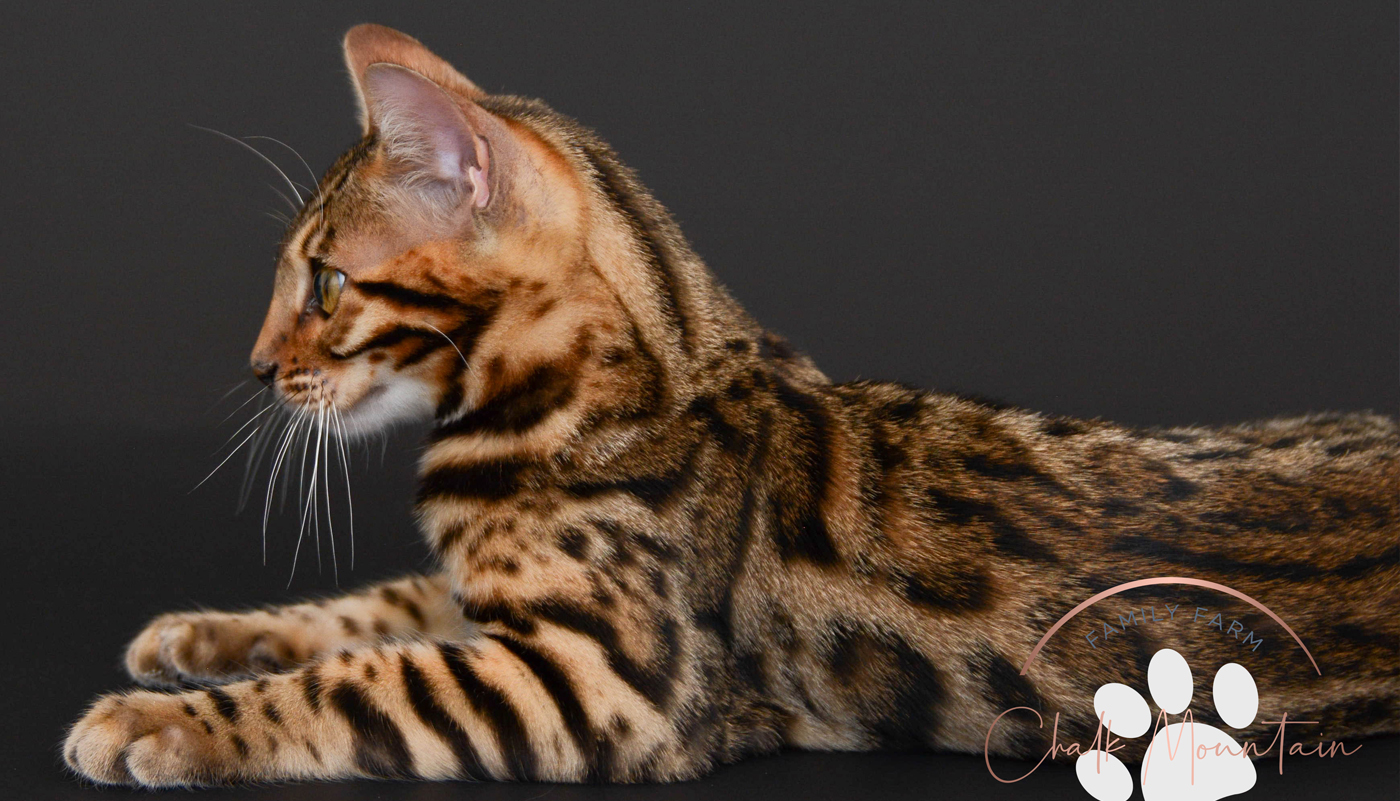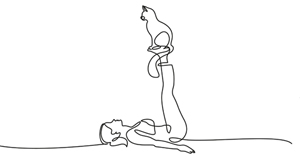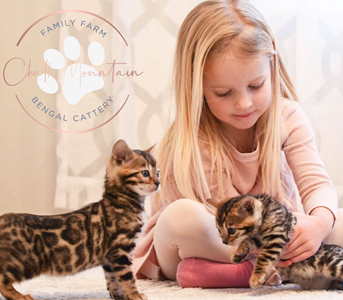
Frequently Asked Questions
Bengal Health Testing and Health Concerns

Knowledge is Power
With the knowledge of Bengal health concerns we can do our best to prevent and control what we can.
What are Bengal cat health concerns?
All cat breeds are prone to genetic diseases whether they are pure-bred Bengals or barn cats. There are three main genetic diseases that Bengals are prone to:
PK-Def (Which causes anemia)
PRA (Which causes blindness)
HCM (Which causes heart failure)
As a responsible breeder we need to do our part by researching and breeding away from these disorders.
Expand/Collapse
PK-Def (Which causes anemia)
PRA (Which causes blindness)
HCM (Which causes heart failure)
As a responsible breeder we need to do our part by researching and breeding away from these disorders.
What is PK-Def?
PK-Def (PK Deficiency) is a genetic condition that impairs the red blood's cells' ability to metabolize. This can cause anemia and other blood related problems. The severity of symptoms cannot be predicted.
Expand/Collapse
What is PRA?
PRA (Progressive Retinal Atrophy) is also a genetic condition, it causes blindness because of the destruction of the cells that register light in the back of the eye. This loss of sight can begin as a kitten and continue to worsen into adulthood.
Expand/Collapse
How do Bengals get PK-Def?
PK-Def is genetically inherited from the parents. For a cat/kitten to be positive for PK-Def they must have two copies of the genetic mutation. If they have one copy they will carry the gene mutation but will not have PK-Def themselves.
Both the mother and father must carry or have PK-Def for the kitten to inherit the condition.
Expand/Collapse
Both the mother and father must carry or have PK-Def for the kitten to inherit the condition.
How do Bengals get PRA?
PRA is genetically inherited from the parents. For a cat/kitten to be positive for PRA they must have two copies of the genetic mutation. If they have one copy they will carry the gene mutation but will not have PRA themselves.
Both the mother and father must carry or have PRA for the kitten to inherit the condition.
Expand/Collapse
Both the mother and father must carry or have PRA for the kitten to inherit the condition.
How to prevent PK-Def?
A responsible breeder should NEVER under any circumstances breed an animal that is positive for Pk-Def. Also, a breeder should NEVER breed two animals who both carry Pk-Def.
If each parent passes down their mutated gene you could end up with an offspring that is positive for Pk-Def.
Expand/Collapse
If each parent passes down their mutated gene you could end up with an offspring that is positive for Pk-Def.
How to prevent PRA?
A responsible breeder should NEVER under any circumstances breed an animal that is positive for PRA. Also, a breeder should NEVER breed two animals who both carry PRA.
If each parent passes down their mutated gene you could end up with an offspring that is positive for PRA.
Expand/Collapse
If each parent passes down their mutated gene you could end up with an offspring that is positive for PRA.
What does Chalk Mountain Bengal Cattery do to prevent genetic disorders?
These is no way to prevent absolutely every single genetic disorder but we do the best we can.
Before breeding any adult Bengal we do extensive DNA testing on our cats. We are proud to say that we have NEVER had a cat or kitten test positive for PK-Def or PRA at Chalk Mountain Family Farm.
All of our DNA results are proudly displayed on our Registered Bengal Cattery Documentation Page.
We use Wisdom Panel testing which tests:
Expand/Collapse
Before breeding any adult Bengal we do extensive DNA testing on our cats. We are proud to say that we have NEVER had a cat or kitten test positive for PK-Def or PRA at Chalk Mountain Family Farm.
All of our DNA results are proudly displayed on our Registered Bengal Cattery Documentation Page.
We use Wisdom Panel testing which tests:
Acute Intermittent Porphyria (Variant 1)
Acute Intermittent Porphyria (Variant 2)
Acute Intermittent Porphyria (Variant 3)
Acute Intermittent Porphyria (Variant 4)
Autoimmune Lymphoproliferative Syndrome
Blood Type
Burmese Head Defect
Congenital Adrenal Hyperplasia
Congenital Erythropoietic Porphyria
Congenital Myasthenic Syndrome
Cystinuria Type 1A
Cystinuria Type B (Variant 1)
Cystinuria Type B (Variant 2)
Cystinuria Type B (Variant 3)
Dihydropyrimidinase Deficiency
Earfold and Osteochondrodysplasia
Factor XII Deficiency (Variant 1)"
Familial Episodic Hypokalaemic Polymyopathy
Glycogen Storage Disease
GM1 Gangliosidosis
GM2 Gangliosidosis
GM2 Gangliosidosis, type II
GM2 Gangliosidosis, type II
Hemophilia B (Variant 1)
Hemophilia B (Variant 2)
Hyperoxaluria type II
Hypertrophic Cardiomyopathy
Hypertrophic Cardiomyopathy
Hypotrichosis
Lipoprotein Lipase Deficiency
Mucopolysaccharidosis Type I
Mucopolysaccharidosis Type VI (T1427C variant)
Mucopolysaccharidosis Type VII
Mucopolysaccharidosis VII
Multidrug Resistance 1
Myotonia Congenita
Polycystic Kidney Disease (PKD)
Progressive Retinal Atrophy (rdAc-PRA)
Progressive Retinal Atrophy (PRA)
Pyruvate Kinase Deficiency
Sphingomyelinosis (Variant 1)
Sphingomyelinosis (Variant 2)
Spinal Muscular Atrophy
Vitamin D-Dependent Rickets
What is feline HCM?
HCM (Hypertrophic Cardiomyopathy) is a common heart disease that affects all breeds of cats (purebred and mixed). Symptoms are not the same in every cat, but normally it makes the muscle of the heart thicker and the heart's function poorer.
Expand/Collapse
How to prevent HCM?
Testing and research for HCM in cats is limited. The best way to prevent HCM is to be responsible with breeding.
Expand/Collapse
Can a cat/kitten be guaranteed free of HCM?
HCM prevention cannot be guaranteed because HCM can occur at any time. This is incredibly important to know because a cat can be cleared of HCM one day and have it the next. There are no reliable DNA HCM tests. There is not a specific test that exists for HCM, however the heart can be screened, measured, and monitored using an echocardiogram from a certified Veterinary Cardiologist. Yearly echocardiograms on breeding cats can be used as a tool for early detection. If the cat shows signs of HCM at any point, it needs to be retired from the breeding program.
Expand/Collapse
Chalk Mountain Bengal Cattery HCM Policy?
We screen all of our cats for HCM yearly by a board certified Veterinary Cardiologist. Not one of our breeding cats has ever been found positive but we continue to screen them as a method of early detection.
All of our current tests are displayed for you on our Registered Bengal Cattery Documentation Page.
Expand/Collapse
All of our current tests are displayed for you on our Registered Bengal Cattery Documentation Page.
